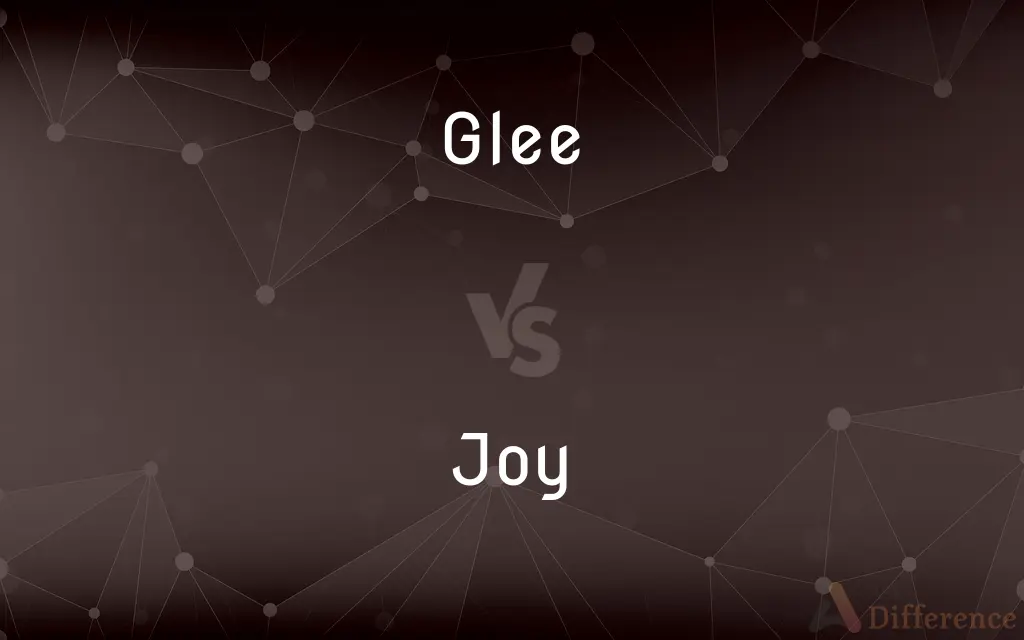Glee vs. Joy — What's the Difference?
By Tayyaba Rehman — Updated on September 14, 2023
Glee is a burst of exuberant happiness or delight, while joy is a profound, often lasting, feeling of happiness or contentment.

Difference Between Glee and Joy
Table of Contents
ADVERTISEMENT
Key Differences
Glee and Joy, while synonymous with happiness, differ in intensity and duration. Glee often suggests a bubbly or over-the-top expression of happiness, sometimes for a fleeting moment. It's that burst of laughter upon hearing a joke or the immediate delight in unexpected good news. Joy, on the other hand, implies a deeper, more encompassing emotion. It's a pervasive sense of contentment, possibly stemming from profound experiences, achievements, or spiritual enlightenment.
When one thinks of glee, the imagery of spontaneous laughter, clapping, or even dancing might come to mind. It's reactive and often tied to a specific moment or trigger. Joy is more reflective, a quiet satisfaction that can be felt without any overt physical manifestations. A person might feel joy after the birth of a child, during a serene moment of meditation, or upon realizing personal growth.
Another differentiation lies in the contexts they're most frequently used in. Glee is often tied to tangible events or stimuli. Winning a game, receiving a gift, or a surprise visit might elicit glee. Joy, however, is broader and can be tied to intangibles. Personal relationships, love, peace, and faith are domains often associated with feelings of joy.
In summary, while both glee and joy describe forms of happiness, glee tends to be more exuberant but momentary, and joy is deeper, potentially more lasting, and can be tied to intangibles as well as milestones.
Comparison Chart
Definition
A burst of exuberant happiness or delight.
A profound, lasting feeling of happiness or contentment.
ADVERTISEMENT
Duration
Often fleeting or momentary.
Can be lasting or permanent.
Intensity
Bubbly, reactive.
Deep, reflective.
Common Associations
Laughter, surprise, immediate reactions.
Contentment, peace, love, spiritual fulfillment.
Physical Expression
Overt expressions like laughter or clapping.
May not have overt physical manifestations.
Compare with Definitions
Glee
An exuberant expression of pleasure.
His eyes sparkled with glee at the surprise.
Joy
A state of delight and well-being.
His heart swelled with joy during the peaceful morning.
Glee
A burst of cheerful delight.
His face lit up with glee when he saw the puppy.
Joy
Elation resulting from success or achievement.
The joy of graduation was evident in her speech.
Glee
High-spirited merriment.
The children's glee was evident during the party.
Joy
A source of happiness or delight.
Her family was her greatest joy.
Glee
Jubilant satisfaction.
She couldn't hide her glee after winning the competition.
Joy
Spiritual happiness or enlightenment.
Many find joy in their faith and beliefs.
Glee
Delightful excitement.
The announcement was met with glee by the fans.
Joy
The word joy means a feeling of great pleasure and happiness.
Glee
Jubilant delight; joy.
Joy
Intense and especially ecstatic or exultant happiness, or an instance of such feeling.
Glee
(Music) A part song scored for three or more usually male and unaccompanied voices that was popular in the 1700s.
Joy
An expression of such feeling.
Glee
(uncountable) Joy; happiness; great delight, especially from one's own good fortune or from another's misfortune.
Joy
A source or an object of joy
Their only child, their pride and joy.
Glee
(uncountable) Music; minstrelsy; entertainment.
Joy
To take great pleasure; rejoice.
Glee
An unaccompanied part song for three or more solo voices, not necessarily merry.
Joy
To fill with ecstatic happiness, pleasure, or satisfaction.
Glee
To sing a glee (unaccompanied part song).
Joy
To enjoy.
Glee
Music; minstrelsy; entertainment.
Joy
A feeling of extreme happiness or cheerfulness, especially related to the acquisition or expectation of something good.
A child's joy on Christmas morning
They will be a source of strength and joy in your life.
Glee
Joy; merriment; mirth; gayety; paricularly, the mirth enjoyed at a feast.
Joy
Anything that causes such a feeling.
The joys and demands of parenthood
Glee
An unaccompanied part song for three or more solo voices. It is not necessarily gleesome.
Joy
Luck or success; a positive outcome.
Glee
Great merriment
Joy
(obsolete) The sign or exhibition of joy; gaiety; merriment; festivity.
Glee
Malicious satisfaction
Joy
(intransitive) To feel joy, to rejoice.
Joy
To enjoy.
Joy
To give joy to; to congratulate.
Joy
To gladden; to make joyful; to exhilarate.
Joy
The passion or emotion excited by the acquisition or expectation of good; pleasurable feelings or emotions caused by success, good fortune, and the like, or by a rational prospect of possessing what we love or desire; gladness; exhilaration of spirits; delight.
Her heavenly form beheld, all wished her joy.
Glides the smooth current of domestic joy.
Who, for the joy that was set before him, endured the cross, despising the shame.
Tears of true joy for his return.
Joy is a delight of the mind, from the consideration of the present or assured approaching possession of a good.
Joy
That which causes joy or happiness.
For ye are our glory and joy.
A thing of beauty is a joy forever.
Joy
The sign or exhibition of joy; gayety; mirth; merriment; festivity.
Such joy made Una, when her knight she found.
The roofs with joy resound.
Joy
To rejoice; to be glad; to delight; to exult.
I will joy in the God of my salvation.
In whose sight all things joy.
Joy
To give joy to; to congratulate.
To joy the friend, or grapple with the foe.
Joy
To gladden; to make joyful; to exhilarate.
Neither pleasure's art can joy my spirits.
Joy
To enjoy.
Who might have lived and joyed immortal bliss.
Joy
The emotion of great happiness
Joy
Something or someone that provides pleasure; a source of happiness;
A joy to behold
The pleasure of his company
The new car is a delight
Joy
Feel happiness or joy
Joy
Make glad or happy
Joy
A deep feeling of happiness and contentment.
The birth of her daughter filled her with joy.
Common Curiosities
How is glee usually expressed?
Glee is often expressed overtly through laughter, clapping, or animated reactions.
Can glee be quiet or reflective?
Glee is usually exuberant and reactive, whereas joy can be quiet and reflective.
Is joy always tied to significant events?
No, joy can arise from simple moments, personal relationships, or spiritual realizations.
Is joy a spiritual emotion?
Joy can be felt in spiritual contexts, but it's not limited to them.
Are glee and joy synonyms?
While both denote happiness, glee is more about bubbly delight, while joy is deeper and more profound.
Is glee more momentary than joy?
Generally, glee is a fleeting burst of happiness, while joy can be lasting.
Can joy be felt without showing it?
Yes, joy is a deep emotion that doesn't always require outward expression.
Can one feel both glee and joy simultaneously?
Absolutely, a moment of glee can also be filled with profound joy.
Is glee always positive?
Typically, yes. But phrases like "taking glee in someone's misfortune" can have negative connotations.
Is joy tied to love?
Love can be a significant source of joy, but joy isn't exclusive to love.
How does glee relate to humor?
Humor often elicits reactions of glee in the form of laughter or delight.
Which is more intense, glee or joy?
While glee is more exuberant, joy is deeper and more encompassing.
Which is more short-lived, glee or joy?
Glee is generally more momentary, while joy can be lasting.
Can a surprise trigger glee?
Yes, surprises are common triggers for glee.
Is joy a calmer emotion than glee?
While joy is profound and deep, glee is more bubbly and immediate.
Share Your Discovery

Previous Comparison
Trochaic vs. Iambic
Next Comparison
Teamwork vs. SynergyAuthor Spotlight
Written by
Tayyaba RehmanTayyaba Rehman is a distinguished writer, currently serving as a primary contributor to askdifference.com. As a researcher in semantics and etymology, Tayyaba's passion for the complexity of languages and their distinctions has found a perfect home on the platform. Tayyaba delves into the intricacies of language, distinguishing between commonly confused words and phrases, thereby providing clarity for readers worldwide.













































